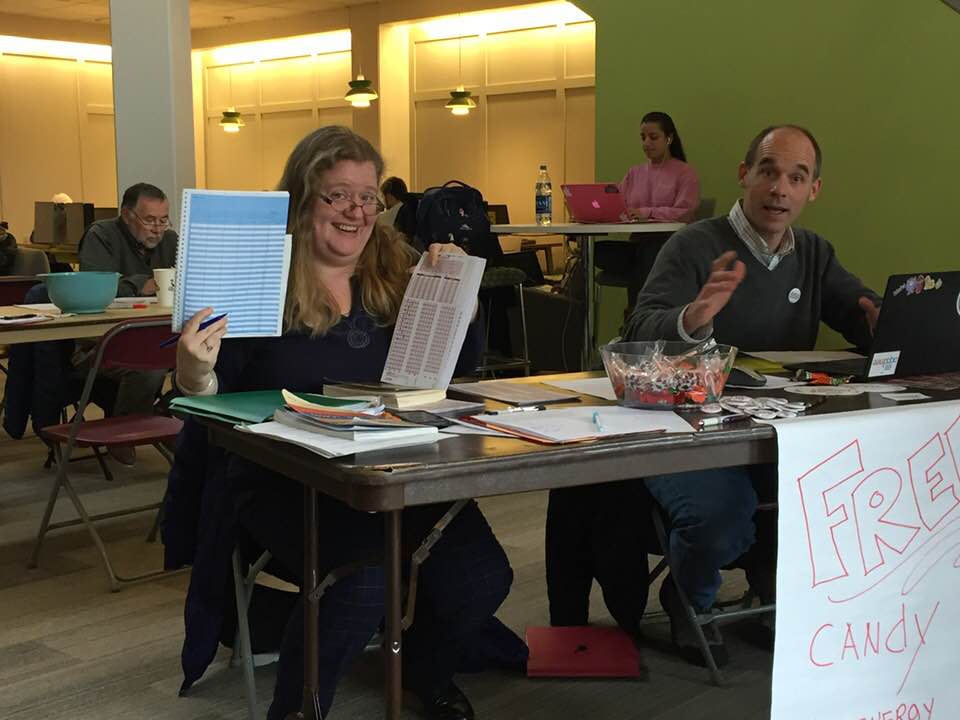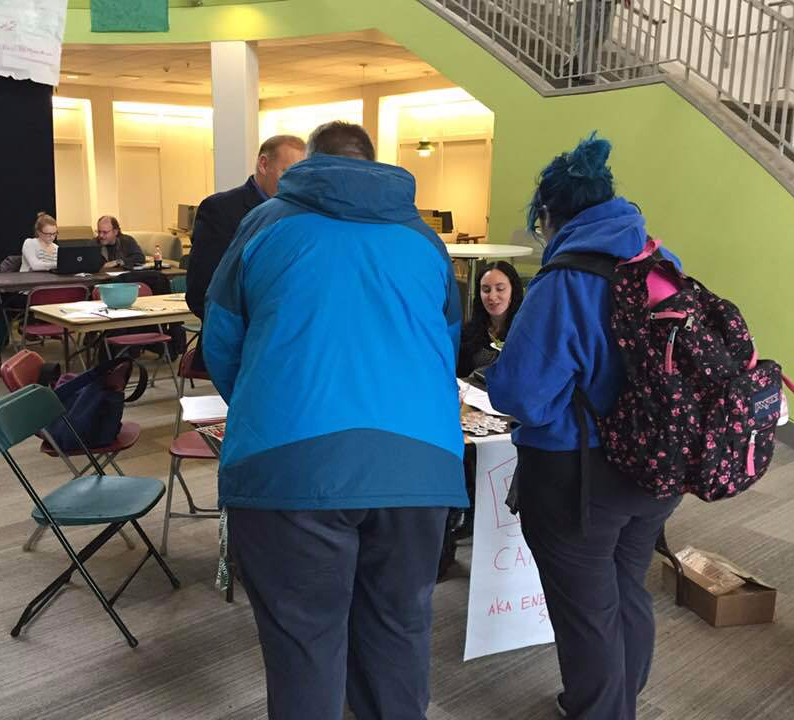 December 13, 2017 — Dr. Jeremiah Duncan delivered a petition to Plymouth State University President, Donald Birx, today, with the signatures of more than 270 students and staff voicing their support for the PSU-AAUP and endorsing the union’s efforts to negotiate a contract that stresses fairness, clarity, and transparency in their workload, compensation, and other working conditions.
December 13, 2017 — Dr. Jeremiah Duncan delivered a petition to Plymouth State University President, Donald Birx, today, with the signatures of more than 270 students and staff voicing their support for the PSU-AAUP and endorsing the union’s efforts to negotiate a contract that stresses fairness, clarity, and transparency in their workload, compensation, and other working conditions.
Duncan (President of the union and a faculty member in the Atmospheric Science & Chemistry Department), delivered more than 15 pages of signatures. As the petition stated: “Our faculty are the lowest paid, hardest working faculty in the USNH system. Their working conditions are our learning conditions. We support a fair contract for a better Plymouth State University!”
The signatures were gathered at a two-day “Grade-In” event held by the PSU-AAUP on December 6 & 7. According to one of the event’s organizers, Dr. Cathie LeBlanc (Communication & Media Studies), the event was designed “to make our work more visible to the campus community, and to students in particular.”

Over the two days, 28 faculty members took turns at tables in the HUB Fireplace Lounge grading papers, exams, and projects, and answering frequent questions from students, staff, and others about the efforts of the faculty union. Dr. Rebecca Noel (History, Philosophy & Social Studies Education) said she personally spoke to at least 15 students over the course of an hour on Wednesday. Like the rest of the faculty at the tables, she kept the message positive. “When I spoke with students, I emphasized that we are looking for a fair contract for PSU professors so that we can do the most for students.”
Another of the event’s organizers, Nick Sevigney (Art), said that positive message was the intent of the Grade-In. He said, “I wanted students to see some of the responsibilities that happen behind the scenes. Grading, service to the university/academia, and the jobs of coordinating a discipline are examples of what the students don’t see faculty doing on a daily basis.”

Some of the students were puzzled, though, that PSU faculty would even need to put on such an event. “I think the students were surprised that faculty would have to do a demonstration to show how much work they do for the university. The students I spoke to all basically responded like ‘Of course I support faculty. Of course you work hard. Of course you devote a lot of your valuable time to me, my learning, my future, and my well-being.'” said Dr. Ann McClellan (former President of the PSU-AAUP and Chair of the English Department). “They seemed to take our commitment and dedication to them as a given and were surprised we may have to explain this to the administration and our community. One student told me his mother was a fourth grade teacher and he remembers standing with her on a picket line when he was a child advocating for better pay and workload conditions. He fully understood the kind of commitments and sacrifices teachers make for their students every day.”
McClellan believes it is not only important to remind students (and the rest of the University) about the work that faculty do, but also to remind them that the faculty-student relationship is the most vital relationship at an institution of higher education. “The educators are the ones who are in direct contact—in relationships—with students every day of the week and often for years at a time. We get to know their strengths and weaknesses, their hopes and dreams, their heartaches and triumphs. And we work with them, mentor them, and challenge them throughout their educational careers so that they can achieve those dreams and overcome those challenges. We have vested interests in our students, and they have vested interests in us. Their well-being is our well-being, and vice versa.’
Sevigney said he hopes the petition reminds the administration that faculty are bargaining for a contract that will help to deepen those relationships. “We are asking for processes and protocols to allow us to do our jobs efficiently and with purpose. The hope is in doing so we will be better able to mentor our students, help them move towards their professional lives, and in turn their community.”

McClellan added that faculty in the AAUP consider themselves to be stewards of the university. “I want people to know that we are bargaining from a position of care: for the quality of our students’ education and the well-being of our colleagues. Without that context of care, it’s easy to dismiss faculty requests for transparency, structure, clear processes, and, yes, fair compensation and benefits in a rising economy, as being ignorant of the real financial demands being placed on families today. We know how much money it costs to send students to college. We want to ensure that that investment is the best investment they can make in their lives. Investing in Plymouth State Faculty is investing in our students’ future and the future of our region.”
The administration did not immediately respond to the petition.
The next bargaining session between the AAUP and the administration is scheduled for January 26.